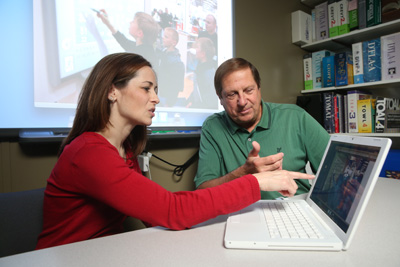Course of Study
The Master of Education Program in Curriculum and Teaching reflects teaching and learning in the 21st Century and is designed to enhance curricular innovation and teaching practices necessary for master teachers. Coursework, field-based experiences, and a final project or thesis are designed to develop and extend abilities to facilitate learning for students. The required twelve credit hours of electives offers choice in selecting a certificate or endorsement program from a menu of contemporary offerings or designing one’s own curricular focus. This choice equips candidates with research and skills applicable to today’s classrooms.
We reserve the right to adjust the courses offered, course sequence and content as necessary to continually upgrade and improve the program.
 CURRICULUM AND TEACHING CORE (12 credit hours): All Required
CURRICULUM AND TEACHING CORE (12 credit hours): All Required
EDTL 6110 Curriculum Inquiry (3) with field experience
EDTL 6770 Curriculum Issues and Trends (3) with field experience
EDTL 6310 Technology in the 21st Century Classroom (3)
EDTL 6500 Advanced Pedagogy and Best Practices (3)
RESEARCH CORE (6 credit hours):
Required:
EDTL 6530 Qualitative Approaches to Classroom Inquiry (3)
Choose One:
EDFI 6410 Statistics (3) OR
EDFI 6450 Using Assessment and Research to Improve Practice (3)
FINAL PROJECT: Choose One (3 credit hours)
EDTL 6910 Master's Project in Curriculum and Teaching (3)
EDTL 6990 Thesis Research (3)
ELECTIVES (min 12 credit hours): Choice of graduate-level endorsement and certificate courses OR Elective courses of your choice
Endorsement and Certificate Courses:
| Description and Coursework | Pre-requisites | ||
| Early Childhood Generalist Endorsement (15 credits) 36 credits total to degree | Prepares teachers holding an Ohio K-3 license to teach all subject areas in grades 4 and 5. EDTL 4500/5500: Upper Elementary Social Studies Instruction (3) EDTL 4501/5501: Upper Elementary Math Instruction (3) EDTL 4502/5502: Upper Elementary Science Instruction (3) EDTL 4503/5503: Upper Elementary Language Arts Instruction (3) HDFS 4504/5504: Development and Learning in Children 8-12 (3) | Ohio K-3 License | |
| Middle Childhood Generalist Endorsement (13 credits) 33 credits total to degree | Prepares teachers holding an Ohio Middle Childhood Education license to add one or two academic areas to their licenses, enabling them to teach the added subjects in grades 4-6. Mathematics
Practicum: EDTL 6890: Internship in Curriculum & Instruction (1) |
Ohio 4-9 Middle Childhood Education License | |
| Reading Endorsement (15 credits) 33 credits total to degree (EDTL 6910 waived for EDTL 6280) | For candidates who wish to focus on positions as reading teachers at all grade levels and with all students. The Ohio Reading Endorsement Program leads to an endorsement on a valid teaching license. In addition to completing these courses, candidates must pass the Ohio Assessment for Educators Reading Subtest I (038) and Reading Subtest II (039) to obtain the PreK-12 Reading Endorsement.
|
(a) Current Educator license (b) complete Baccalaureate degree, and (c) completion of 9-12 prerequisite hours of reading course work, dependent on current license held | |
| Computer Technology Endorsement (16 credits) 34 credits total to degree (EDTL 6120 waived for EDTL 6310) | Prepares teachers for leadership capabilities for local, state or national educational technology initiatives; candidates also will be licensed to teach K-12 computer science courses. · EDTL 6310: Technology in the 21st Century Classroom (3) · EDTL 6320: Technology Leadership and Professional Development (3) · EDTL 6330: Dynamic Media (3) · EDTL 6350: Real World School Tech (3) · EDTL 6360: Internet in the Educational Community (3) · EDTL 6390: Special Topics in Classroom Technology (1) | ||
Workforce Development Certificate 35 graduate credits total to degree |
Certificate is required course work to advance a 4-year Ohio Alternative Educator License to a 5-year Ohio Professional License.
|
|
|
| Autism Spectrum Disorders Certificate (15 credits) 33 credits total to degree | Provide educators with knowledge and skills to meet the educational and psychosocial needs of individuals with ASD
|
||
| Assistive Technology Certificate (15 credits) 36 credits total to degree | Enables educators to help individuals with disabilities participate more fully in their homes, schools and communities through assistive technology.
|
Introductory course in special education (EDIS 5310 or its equivalent) | |
| Secondary Transition Certificate(15 credits) 36 credits total to degree | Help students with disabilities be successful in life after high school
|
Elective suggestions include:
EDFI 6000 Philosophy of Education
EDFI 6010 Comparative Education
EDFI 6020 History of Education
EDFI 6030 Cultural Studies in Education
EDTL 6200 Content Literacy P-12
EDTL 6800 Graduate Seminar in Curriculum and Instruction
EDTL 6950 Workshop in Curriculum and Instruction
EDTL 7100 Curriculum and Instructional Design
EDTL 6820
Updated: 10/16/2023 09:59AM

